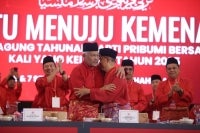Keys to employment success
DR ILHAAMI ABDUL GHANI AZMI
IN today's landscape, unemployment remains a significant concern for any graduate.
According to the Department of Statistics, Malaysia's unemployment rate stands at 3.5 per cent.
Therefore, an individual's personality, attitude and skills are pivotal in the realm of employment.
Employers tend to select candidates based on their highlighted personalities, good attitudes and relevant skills, in addition to favourable academic achievements.
Many mistakenly equate attitudes with personalities, considering them as synonymous.
However, according to Holland's Job Matching Personality Model, an individual's personality should align with their chosen occupation for sustained professional success.
The model identified six personality types: Realistic, investigative, artistic, social, enterprising and conventional.
Each type suits specific professions, ensuring a harmonious match between the individual and their job requirements.
Realistic Personality: Inclined toward physical activities demanding strength, coordination and skills.
Suitable professions include architects, farmers and engineers.
Investigative Personality: Thrives on working with theories, information and understanding.
Professions such as lawyers, professors and mathematicians alignd with this personality type.
Artistic Personality: Creative, imaginative, and idealistic individuals.
Ideal professions include artists, musicians and writers.
Social Personality: Enjoys helping others in healing and development roles.
Professions like counselors, doctors and teachers suit individuals with a social personality.
Enterprising Personality: Inclined towards competitive environments, adept at influencing others, energetic and self-confident.
Management, marketing and sales roles fit individuals with enterprising personalities.
Conventional Personality: Prefers decision-making based on rules, efficient and practical.
Suitable occupations include accountants, clerks and editors.
Attitudes are divided into positive and negative types.
Employers seek positive attitudes like a desire to learn, diligence, responsibility, discipline, innovation, creativity and transparency.
Skills crucial for employment encompass time management, teamwork, problem-solving, communication, decision-making and organisational skills.
According to interviews with three organisations, the largest automotive organisation in the country valued the ability to perform tasks as the most demanded skill among their graduate employees.
This skill is deemed crucial to ensure the market success of their vehicles.
A monopoly organisation in the country appreciates extraversion as a favoured personality trait, emphasising its significance in communication skills.
This organisation also agreed that skills were a vital factor in hiring decisions.
Similarly, a Small and Medium Enterprise (SME) organisation also highlighted the importance of skills as the most observed job skill.
According to them, many graduates struggle with choosing appropriate attire for interviews.
However, they emphasised that overdressing was unnecessary; formal and modest attire sufficed.
Appropriate attire correlates with discipline and reflects a graduate's personality.
Thus, meticulous planning for interview sessions is crucial.
Graduates are advised to plan for success, not failure.
All three organisations unanimously agree on the significance of interpersonal skills.
These skills are crucial in building positive relationships among colleagues, aligning with teamwork skills, a key aspect of job skills.
Consequently, institutions of higher learning should integrate positive personalities, good attitudes and job skills into their curriculum.
This alignment aimed to ensure that graduates secure employment promptly upon graduation.
The author is an Associate Professor in the Department of Syariah and Management, Academy of Islamic Studies, University of Malaya, and can be contacted at amieazmi@um.edu.my.
The views expressed in this article are the author's own and do not necessarily reflect those of Sinar.
Download Sinar Daily application.Click Here!














